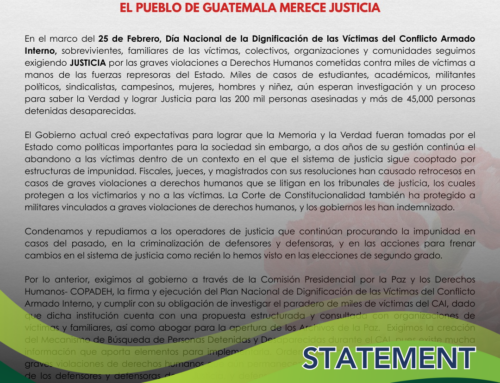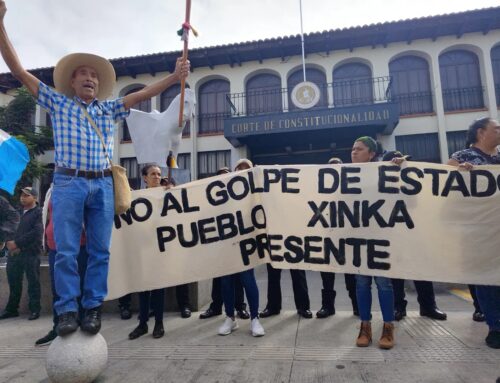On November 5, almost six months since the highly contested decision by Guatemala’s Constitutional Court (CC) to annul the genocide sentence, Guatemalan courts announced a date for the retrial of former General Ríos Montt. Guatemala’s High Risks Court “B” affirmed that it has the jurisdiction to hear the case but said its calendar is full until January 5, 2015.
Constitutional Court decision opens door for Ríos Montt to receive amnesty
On October 22, the Constitutional Court ruled in favor of an appeal presented by Ríos Montt’s defense, opening the door to amnesty for war crimes. The appeal, one of many filed by the defense lawyers on the issue of amnesty, argued that due process was not respected in a decision on wartime Decree 8-86. Decree 8-86, dating back to the de facto government of Oscar Humberto Mejía Víctores (1983-1986), mandated a blanket amnesty for all crimes committed between March 23, 1982 and January 14, 1986. Both former military generals Mejía Víctores and Ríos Montt are currently accused of genocide and would benefit from the application of amnesty.
Ríos Montt’s lawyers argued that Judge Miguel Ángel Gálvez Aguilar, who ruled against the possibility of amnesty, based his decision exclusively on Guatemala’s 1996 National Reconciliation Law, and did not incorporate analysis of Decree 8-86. The National Reconciliation Law, created in 1996 with the signing of the Peace Accords, explicitly excludes genocide from the application of amnesty.
Judge Gálvez Aguilar’s decision was immediately contested by the defense; however, an Appeals Court upheld the ruling, denying amnesty for war crimes. Now, the Constitutional Court has ordered the Appeals Court to elaborate in its explanation and provide foundation for its previous decision. While the Constitutional Court ruling alone does not grant amnesty, the decision sends an unequivocal message to lower courts encouraging them to reconsider previous rulings.
The 1996 Reconciliation law, in conjunction with the Inter-American Convention on Human Rights1. and the Convention for the Prevention and Punishment of the Crime of Genocide2, both ratified by the state of Guatemala, clearly invalidate the 1986 “auto-amnesty” decree, rendering the decision of the Constitutional Court, “a flagrant violation of international human rights law and the obligation to guarantee the right to truth, justice and reparations for the victims3..”
At the time of publication, it is unclear when a decision on amnesty will be made as the lower court ordered to review the previous ruling on amnesty has been plagued by delays and recusals by Appeals Court judges. Anselmo Roldán, President of the Association for Justice and Reconciliation, denounced these malicious delay tactics during his recent NISGUA speaker tour and called for and end to the partiality of the national justice system.
1 http://www.cidh.oas.org/basicos/english/Basic4.Amer.Conv.Ratif.htm
2 http://treaties.un.org/pages/ViewDetails.aspxsrc=TREATY&mtdsg_no=IV-1&chapter=4& lang=en
3 FIDH, Anulación de la condena al General Ríos Montt: la FIDH solicita a la Corte de Constitucionalided de Guatemala reformar su decisión. Aug. 9 2013. www.fidh.org/anulacion-de-la-condena-al-general-Ríos-montt-la-fidh-solicita-a-la-corte-13809
NISGUA has provided human rights accompaniment to the witness organization, the Association for Justice and Reconciliation, and their lawyers, the Center for Human Rights Legal Action, since 2000.
Original article published on November 25th, 2013 by ACOGUATE






Leave A Comment